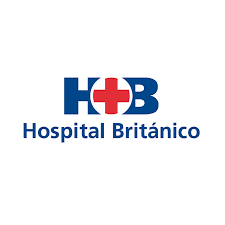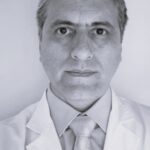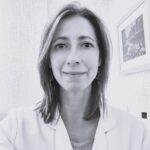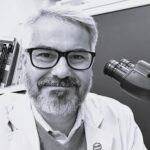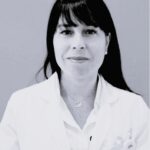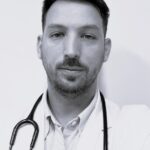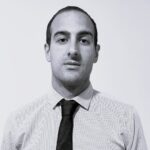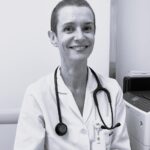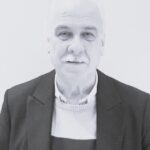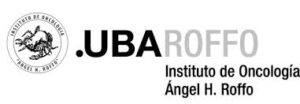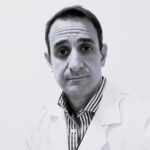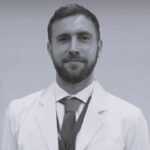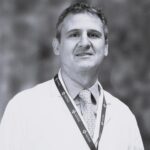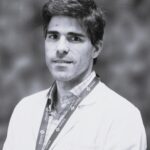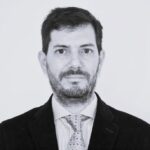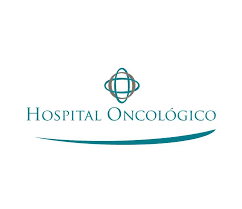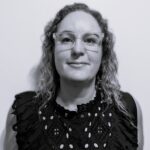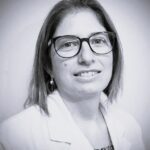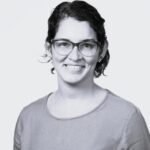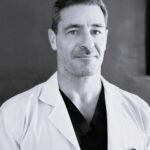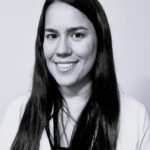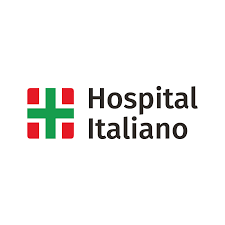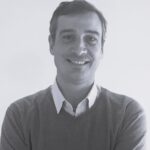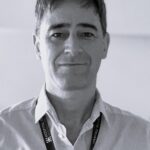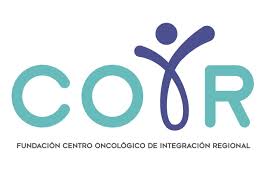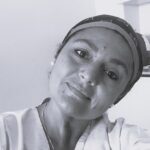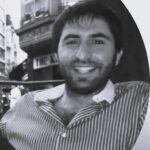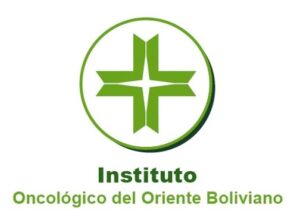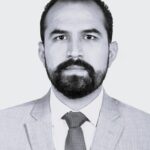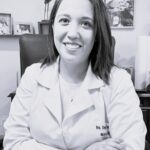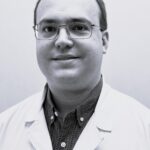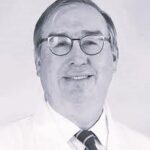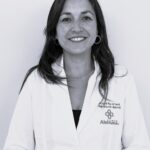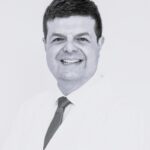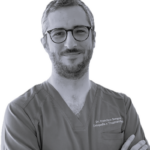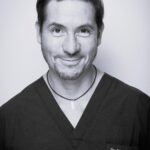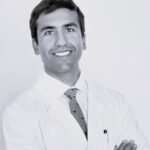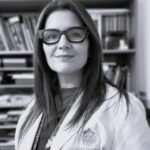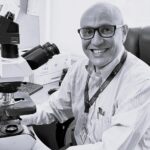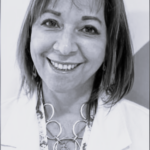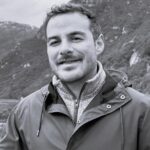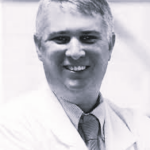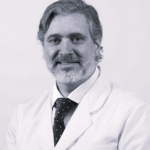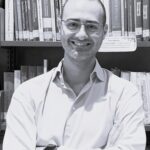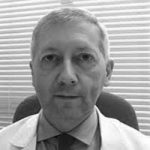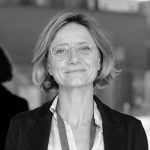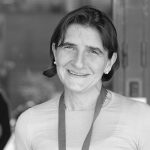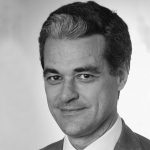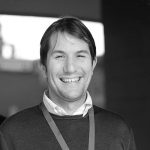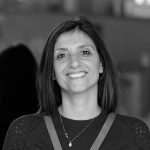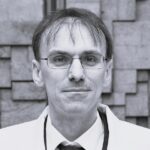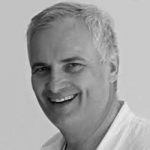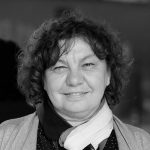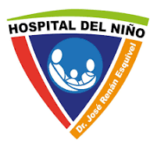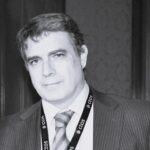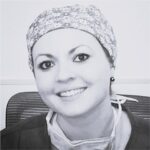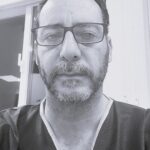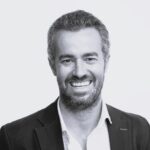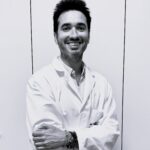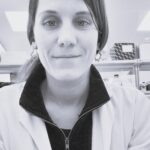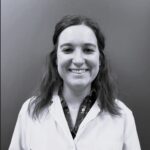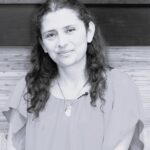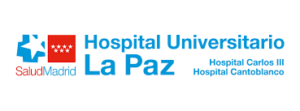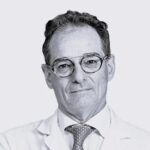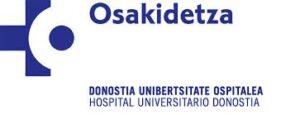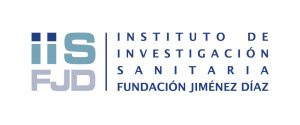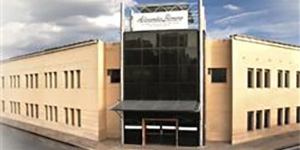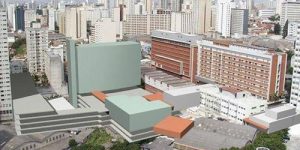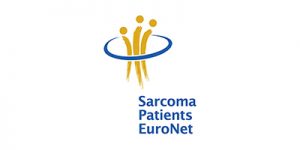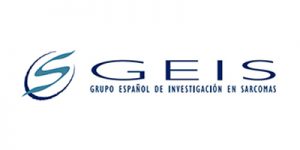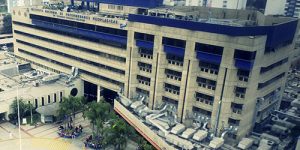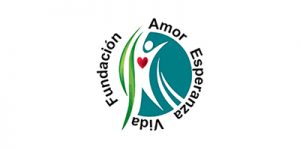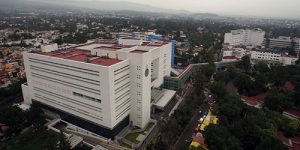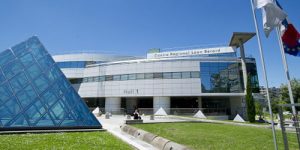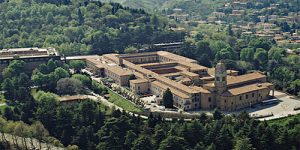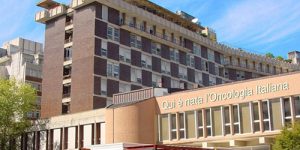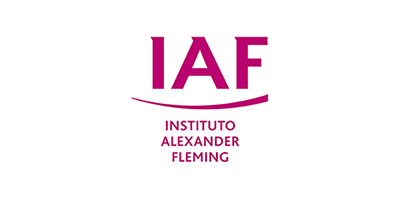 Con domicilio social en Carmer 1180, Buenos Aires C1426NZ (Argentina). NIF: AR30645337979.
Con domicilio social en Carmer 1180, Buenos Aires C1426NZ (Argentina). NIF: AR30645337979.
El 14 de marzo de 1994, el Instituto Alexander Fleming abrió sus puertas a la excelencia médica y científica. Alexander Fleming es la primera institución privada en Latinoamérica dedicada a la prevención, el diagnóstico y el tratamiento integral de pacientes con cáncer. Su fuerza reside en la excelencia médica, realizada en condiciones óptimas, con tecnología de alta complejidad, puesta al servicio de los pacientes y la sociedad, mediante una labor constante de investigación y docencia. El Instituto está vinculado a la Facultad de Medicina de la Universidad de Buenos Aires para alcanzar altos objetivos académicos y científicos.
Alexander Fleming es la primera institución argentina autorizada por el Programa Nacional de Donantes de Médula Ósea de Estados Unidos (NMDP) para realizar trasplantes de médula ósea de donantes no emparentados. Hoy, con importantes inversiones en infraestructura de internación y tecnología de alta complejidad, se destaca la calidad médica, el alto nivel técnico-científico y la comodidad, convirtiéndola en una de las instituciones más prestigiosas del país.
Miembros:
- Matías Chacón, Médico Oncólogo y Socio Líder
- Tomás Soulé, Oncólogo Clínico Finalista con Perfil Traslacional
- Andrés Rodríguez, Oncólogo Clínico Responsable del Área Educativa
- Martín Angel, Oncólogo Médico
- Yanina Pfluger, Oncóloga Médica
- María Lucia González, Patología

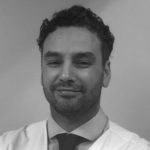
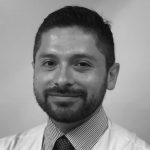
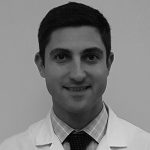
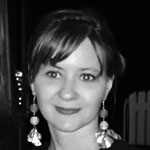
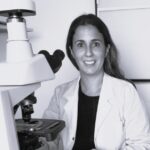
Establecido en Perdriel 74 , Buenos Aires – 1280AEB (Argentina) Número de IVA: 30-54593356-6.
El Hospital Británico de Buenos Aires es una asociación civil sin fines de lucro cuyo objetivo es brindar a la comunidad atención médica de alta complejidad, formar profesionales médicos de excelencia y desarrollar conocimiento científico de vanguardia para el país y el mundo.
Fundada en 1844 por la comunidad británica en Argentina, integrada por las comunidades irlandesa, galesa, escocesa e inglesa, se ha mantenido siempre abierta a toda la sociedad, con un firme compromiso con los valores de transparencia, responsabilidad, integridad y servicio en la atención de la salud.
El Hospital se destaca por sus logros de vanguardia, por la fundación de la Escuela de Enfermería más antigua del país y por la alianza con la Universidad de Buenos Aires y la Universidad Católica Argentina, que lo califican como Unidad Docente y Hospital Universitario, respectivamente.
Atiende a casi un millón de pacientes al año; capacita gratuitamente a generaciones de enfermeras; y capacita a decenas de profesionales médicos cada año. Cuenta con más de 2500 profesionales de la salud y una red propia de centros, con presencia en la Ciudad de Buenos Aires y el Área Metropolitana de Buenos Aires.
Miembros:
- Sergio Damian Quildrian, Jefe de Cirugía de la Unidad de Sarcoma Funcional y Melanoma
- Luciana Bella, Oncóloga Médica
- Pablo Ignacio Dezanzo, Patólogo
- María F. Montaña, Psicóloga Oncológica
- Agustín Montes Onganía, Cuidados paliativos
- Walter Sebastian Nardi, cirujano oncólogo
- Cintia Novas, Médica Oncóloga
- Carlos Alberto Silva, Oncólogo Médico
Instituto de Medicina Experimental para el Estudio y Tratamiento del Cáncer, nombre con el que se iniciaron las actividades del actual Instituto de Oncología, fue la respuesta de la Academia Nacional de Medicina a la propuesta del Dr. Daniel Cranwell y a la presentación de un trabajo bien documentado llamado ‘El Cáncer Experimental’ del Dr. Angel Honorio Roffo en 1912.
On April 19, 1922, the first pavilion began to operate, with inpatient wards for men and women, an operating theatre with sterilisation rooms, laboratories, X-ray room, consulting rooms and offices for administration and management, becoming the first oncological establishment in Latin America.
With the support of the Faculty of Medicine, on which the Institute depended, and the contribution of private donations and resources voted by the National Congress, the construction of new wards began, which became more and more necessary due to the incessant increase in the number of consultations.
The importance that Dr. Angel H. Roffo, director of the institution, attached to research was realised with the construction of the Emilio Costa Pavilion, which was opened in 1923. The Director’s wife, Helena Larroque, contributed intelligence, imagination and effort by creating the Nurses’ School. In 1927, the Costa family donated the Santa Francisca Romana Chapel, with an E. F. Walcker & Cie organ, to bring peace through music to patients, their families and the general public.
Nowadays, the Instituto de Oncología ‘Ángel H. Roffo’ of the University of Buenos Aires occupies an area of almost 4 hectares, with large green spaces and 13 pavilions.
The 100 years of the Institute coincide with the century of the greatest advances in medicine in the history of mankind and the Institute has accompanied every step taken by science applied to health in the field of cancer through research, teaching and application of the different therapeutic approaches that have been developed in the world.
Members:
- Sergio Damian Quildrian, Chief of Surgery Functional Sarcoma and Melanoma Unit
- Anabella Llanos, Chief of Oncology Sarcoma and Melanoma Unit
- Gonzalo Cervelo, Surgical Oncologist
- Anabella Daffinoti, Surgical Oncologist
- Julieta Gerino, Surgical Oncologist
- Romina Valeria Infantino, Oncologist Psychologist
- Sonia Patron, Surgical Oncologist
- Andres Rodriguez, Radiation Oncologist
- Melisa Salinas, Surgical Oncologist
- Fernando Carrizo, Pathologist
Established in Av. Pres. Juan Domingo Peron 1500, B1629 Pilar Centro, Buenos Aires (Argentina).
In the 1970s, a group of doctors dreamed of a university hospital that would fulfil the triple objective of teaching, research and care, providing society with professionals with the best technical education and the highest human training.
They were, among others, Doctors César Bergadá, Ricardo Dodds, Leonardo Mc Lean and Enrique Malbrán. With that goal in mind, Universidad Austral’s School of Biomedical Sciences was founded in 1996, and in 2001, it would have its first graduating class of doctors and nursing graduates.
At the same time, the Pérez Companc Foundation decided to generously support the development of the Hospital, which was inaugurated on May 2, 2000.
Since then, the Hospital and the Faculty have been working as a team, combining efforts, knowledge and training to meet every challenge.
Members:
- Marcos Galli, Orthopaedic Oncologist
- Jonathan Rosenvasser, Radiologist
- Estefania Risau, Pathologist
- Miguel Rizzo, Medical Oncologist
- Nicolas Marcolini, Medical Oncologist
- Nicolas Minatta, Medical Oncologist
Established in Bajada Pucará, X5000 Córdoba, (Argentina).
The Provincial Oncology Hospital is an institution specialised in the treatment of oncological diseases, inaugurated by the former governor José Manuel De la Sota in 2004.
Since then it has played a vitally important role for the population, due to the frequency of this pathology. It is the only one of its kind in the Province of Cordoba and its objective is to facilitate access to diagnosis, treatment, support and accompaniment for patients and their families.
Our mission is the integral care of the patient, based on the commitment of our work, vocation and multidisciplinary approach.
Members:
- Gisela German, Medical Oncologist
- Florencio Segura, Orthopedist
- Pablo Segura, Orthopedist
- Facundo Segura, Orthopedist
- Fili Teresita, Pathologist
- Gabriela Genovese, Radiologist
Established in Av. Mariano Moreno 1213-Posadas Misiones (Argentina).
The Parque Salud de la Provincia de Misiones “Dr. Ramón Madariaga” was created through Law XVII Nº70, approved by the Misiones House of Representatives.
Today, people from Misiones can undergo highly complex studies and procedures without having to travel to other provinces or private clinics.
The mission of the Parque de la Salud is to provide comprehensive and quality care to the population, with professional commitment to the patient.
The health care objectives of the Health Park are related to the prevention and diagnosis of diseases; rehabilitation and recovery of health; development of health promotion and protection activities; contribution to the medical and/or health care assistance of people suffering from diseases; provision of resources necessary for the optimal development of emergency medicine; development of intensive care service units through a sustainable strategic plan, oriented to quality and clinical excellence; guaranteeing universality, equity, quality, efficiency, effectiveness and integrity in the services provided.
With respect to training programs, the Health Park aims at planning and executing permanent training and improvement programs for human resources in order to complement academic training and professional practice at all levels of the Park’s staff.
ELNET member centers:
Instituto Misionero del Cancer (IMC)
Hospital Escuela de Agudos “Dr. Ramón Madariaga”.
Members:
- Marcela Kober, Medical Oncologist
- Alvaro Otero, Orthopaedic
- Jordana Sandoval, Radiologist
- Emanuel Acosta, Radiation Therapist
- Silvana Pavlinovic, Pathologist
- Jonathan Zarza, Surgeon Oncologist
Established in Tte. Gral. Juan Domingo Perón 4190, Buenos Aires (Argentina).
The Hospital Italiano de Buenos Aires is a non-profit civil association dedicated to comprehensive health care. Since 1853, it has been providing medical care, training undergraduate and postgraduate students, and conducting basic, clinical and population-based research.
From a healthcare point of view, the Hospital Italiano offers more than 40 medical specialties and has a complete diagnostic and treatment equipment, as well as a renowned professional staff.
The integrated health network of the Hospital Italiano is made up of the Central Hospital, the San Justo Hospital and 15 Outpatient Medical Centres distributed throughout the different neighbourhoods of the Federal Capital and Greater Buenos Aires.
The Central and San Justo branches are available for emergency and more complex situations. The Outpatient Medical Centres provide the community with the necessary specialities and practices for frequent and preventive health care.
We aspire to be an institution of excellence, leader in the Argentinean health system and integrated to the international scientific community.
Members:
- Federico Cayol, Medical Oncologist
- Jose Alberto, Orthopedist Oncologist
- Pablo Roitman, Pathologist
- Ana Antivero, Medical Oncologist
Established in Montecaseros 1020,M5500 Mendoza (Argentina).
The COIR Foundation was born from the joint work of the Mendocina League for the Fight against Cancer and FUESMEN.
What distinguishes COIR from all other care centres is the support we provide to our patients with a view to improving their quality of life. This is why we have an interdisciplinary support service that addresses issues related to the reality of the oncological process.
Our mission is to provide comprehensive care and excellence in clinical oncology based on up-to-date scientific knowledge and appropriate technology.
Dedicated exclusively to the development of
Prevention
Diagnosis
Treatment
Monitoring of oncology patients
Members:
- Gema Aguil, Medical Oncologist
- Agustin Dimenza, Medical Oncologist
- Roman Oberti, Medical Oncologist
Established in Hipolito Yrigoyen 384, Córdoba (Argentina).
In 1937, Prof. Dr. Guillermo Allende and his wife María Celia Minetti understood the great challenges of medicine in the 20th century and dreamt of creating a medical centre that would make a difference for the quality of its services in Córdoba. With dedication, effort and hard work they founded the Sanatorio Allende. It opened its doors in Hipolto Yrigoyen 384, in the city of Cordoba, in what used to be the family home adapted for this purpose.
His values, his mission and his vision are present in the members of his family, who today carry out the great responsibility and commitment to make Sanatorio Allende the most important multipurpose medical institution in Cordoba.
Vision
To be a leading hospital network in Argentina committed to quality care, teaching and research.
Mission
We work to provide the highest quality and safety in health care, focusing on the needs of our patients and their families.
Values
Professional competence.
Ethics and respect.
Commitment to quality.
Knowledge generation.
Members:
- Mª Agustina Tissera, Medical Oncologist
- Lorena Zecchini, Orthopedist Surgeon
- Rodrigo Ré, Radiologist
- Veronica Vera, Radiotherapist
- Jorge Flores, Pathologist
- Antonio Pedro Maraude, Orthopedist Surgeon
Established in Av. Noel Kempff Mercado, Santa Cruz de la Sierra (Bolivia). VAT number: 3233921014
We are the only exclusively oncological public hospital in the country, therefore we are the reference centre for cancer in Bolivia, which means that we receive patients from all over Bolivia. . The Institute has oncological surgery services (digestive surgery, vascular surgery, thoracic surgery, traumatology, head and neck surgery, urology, neurosurgery, anaesthesiology), mastology, gynaecological oncology, radiotherapy and oncology. Mastology, gynaecological oncology, radiotherapy, clinical oncology, haematology, paediatrics, intensive care, palliative care, pain unit, pathology, imaging and supporting specialties (internal medicine, nephrology, infectious diseases). Care is subdivided by tumour type, so there are tumour committees dedicated to these (tumour committees for mastology, gynaecology, surgery, urology, sarcoma, melanoma and head and neck).
Members:
- Lucia Richter Paz, Medical Oncologist
- Miguel Velasco Paniagua, Traumatologist Oncologist
- Carolina Henestrosa, Pathologist
- Stephanie Ruilowa, Radiologist
- Liceth P. Vacaflor, Radiologist Oncologist
- Celinda Condori, Medical Oncologist
- Sebastian Risso Hurachi, Medical Oncologist
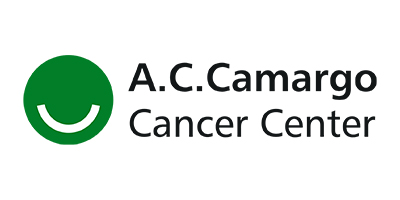 Established in Rua Prof Antonio Prudente 211, Sao Paulo 01509010 (Brazil).
Established in Rua Prof Antonio Prudente 211, Sao Paulo 01509010 (Brazil).
The ACCCC, founded in 1953, has a unique history in fighting cancer. The Center has pioneered all aspects of cancer treatment, education, and research in Brazil. The Institution was the first dedicated to treatment of patients with cancer (1953), to have a residency program in Oncology (1953), to establish a Pediatric Oncology Department (1964); to perform the first breast conserving surgery in Brazil; to partner with an International Basic Research Institute – The Ludwig Institute for Cancer Research (1983 – 2010); to structure a Biobank certified by the National Research Ethics Committee (1997); and to implement a graduate program in Oncology in a private Institution recognized by the Ministry of Education. During all these years, the Institution has been providing prevention, diagnosis, treatment, education, and research (basic, translational, and clinical). Taken together, these activities show the pioneering role ACCCC has filled as a Cancer Center. Indeed, in 2011 the Institution changed its name from Hospital do Cancer A.C.Camargo to A.C.Camargo Cancer Center.
Members:
- Ademar Lopes, Chief of the Sarcoma Team
- Fernando Augusto Campos, Medical Oncologist
- Tiago Goss dos Santos, Investigational Oncologist
- Antonio Nascimento, Pathologist
- Felipe D’Almeida Costa, Pathologist
- Samuel Aguiar Junior, Pathologist
- Cassia da Silva, Research Nurse
- Maria Leticia Gobo Silva, Radiation Oncologist
- Suely Akiko Nakagawa, Orthopaedic Surgeon
- Bruna Catin, Research Nurse.
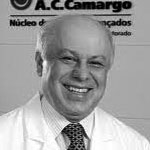
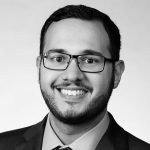
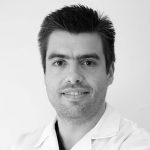
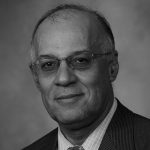
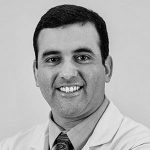
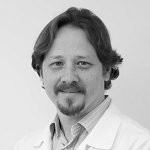
 Established in R. Treze de Maio 1815, Bela Vista, Sao Paulo 01323-020 (Brazil).
Established in R. Treze de Maio 1815, Bela Vista, Sao Paulo 01323-020 (Brazil).
The Oswaldo Cruz German Hospital model of care summarises the efficiency and hospitality that mark the Hospital’s vocation to care for people’s health. The balance between tradition and modernity is the hallmark of the Care Team, which has always occupied a prominent position since its foundation in 1897.
Decisions on patient care are based on the best scientific evidence and take into account the patient’s life history and needs. Self-care education is also one of the fundamental premises of the hospital’s model of care.
Committed to the well-being of its patients, the Hospital Alemão Oswaldo Cruz Care Model seeks to establish good relations between patients, relatives, physicians and employees.
The Care Team at Hospital Alemão Oswaldo Cruz is considered one of the best in the country and stands out in Latin America for offering individualised, comprehensive and humanised care, always focusing on the patient and the family.
We generate and disseminate knowledge through investments to promote innovation, research and education. We train talent and support the development of professionals through technical, undergraduate and postgraduate courses.
Members:
- Waldec Jorge David, Medical Oncologist
- Naira Dos Santos, Radiologist
- Rodrigo De Morais, Radiologist
- Larissa Martins Medical Oncologist
 Established in Av. Manquehue Nte. 1410, Vitacura, (Chile).
Established in Av. Manquehue Nte. 1410, Vitacura, (Chile).
More than 100 years caring for the health of the Chilean people
This health centre is part of a joint stock company called Grupo Alemana SpA, whose sole owner is the Corporación Chileno Alemana de Beneficencia, a non-profit organisation created in 1905, to which Clínica Alemana de Temuco and Clínica Alemana de Valdivia also belong.
Clínica Alemana de Santiago’s constant policy of reinvesting profits has allowed for sustained growth in accordance with the needs of the times.
This health centre has two sites in the eastern sector of the capital, where it has assembled a multidisciplinary professional team and the most advanced technology for diagnosis and treatment in all medical specialties.
The main building is located in Vitacura and, in addition to offering clinical services, hospitalisation and examinations, includes a 16-storey tower for medical consultations and outpatient procedures.
Clínica Alemana de Santiago is an institution accredited by the Joint Commission International and is considered the best clinic in Chile and the second in Latin America by the consulting firm América Economía Intelligence.
Members:
- Mary Ann Stevens, Medical Oncologist
- Alvaro Encina, Medical Oncologist
- Hans Harbst, Radiation Therapist
- Claudia Carvajal, Radiation Therapist
- Biserka Spralja, Pathologist
- Karen Goset, Radiation Therapist
- Felipe Capdeville, Surgeon
- Arturo Madrid, Surgeon
- Ingrid Plass, Surgeon
- Guillermo Chong, Radiation Therapist
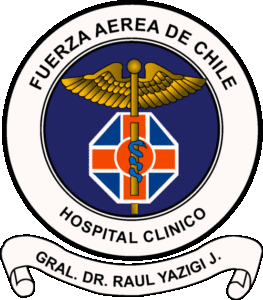 Established in Av. Las Condes 8631, Las Condes (Chile).
Established in Av. Las Condes 8631, Las Condes (Chile).
The first premises of the Institutional Hospital were inaugurated on 26th August 1958, in the buildings of the former monastery of the Benedictine Monks in the Commune of Las Condes.
Later, during the first years of the seventies, a second stage called Building H was inaugurated, which housed Hospital Services such as: Medicine, Surgery, Intermediate Medical, ICU, Pensionado, Laboratory, Surgical Pavilions and other Services.
Finally, in August 1997, a last building for the Clinical Hospital, called Magneto, was planned for the future, which will position our Health Care Centre as a highly complex tertiary, teaching and extension hospital.
The Air Force Clinical Hospital ‘General de Brigada Aérea Raúl Yazigi Jauregui’, is the executive body whose mission will be to provide preventive and curative medical care to institutional personnel, their families and other authorised beneficiaries of the Institutional Health System in accordance with the law.
It will also develop capabilities to act as a Trauma Hospital in war, participate in strategic and tactical aeromedical evacuation operations and redeploy in support of an institutional or national emergency.
In addition, it will develop teaching, research and training activities to raise the level of specialisation of the members of the Clinical Hospital.
To be recognised as the best Armed Forces Hospital in the region for providing humanised, safe and reliable health care, based on the high technical quality of its processes and its human capital.
Members:
- Juan Pablo Miranda, Medical Oncologist
- Francisco Bengoa, Traumatologist
- Nicolás Isa, Radiotherapist
- Pablo Mella, Thoracic Surgeon
- Harry Macias, Palliative Care
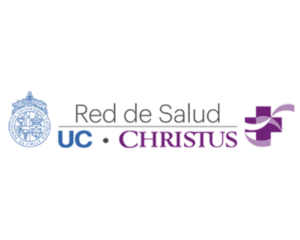 Established in Marcoleta 367, Santiago (Chile).
Established in Marcoleta 367, Santiago (Chile).
UC CHRISTUS is the largest private health care network in the country with a large clinical field where the doctors of tomorrow are trained.
In 2013, the Pontificia Universidad Católica de Chile partnered with CHRISTUS Health, one of the 10 largest private Catholic healthcare institutions in the United States and part of the Order of the Sisters of Charity of the Incarnate Word, to expand its healthcare network in Chile and Latin America.
It has eleven Medical Centres, including three family health centres operating in areas of high vulnerability in the Metropolitan Region. It also has an extensive network of sampling units for laboratory tests, a hospital and two clinics.
Our commitment is to deliver reliable medicine in a model of care centred on patients and their families.
In each of our actions we seek to promote a culture of quality and safety and the constant development of our staff, as well as to be a model clinical field for the training of professionals of excellence, respectful of the dignity of people and of a morality based on Christian principles, as a service to Chile and to the Church.
Our mission is to provide people and their families with comprehensive, quality health care that contributes to their wellbeing, respecting their dignity and inspired by Christian principles, by teams of great human quality and professional and academic excellence.
Our Vision is to be the leading Health Network in Latin America in the clinical practice of excellence and in the development of knowledge for the care of the person, based on the values of the Catholic Church, in collaboration with other national and foreign institutions.
Members:
- Erica Koch, Medical Oncologist
- Eduardo Botello, Orthopaedic surgeon
- Tomas Zamora, Orthopaedic surgeon
- Antonieta Solar, Pathologist
- Jose Valbuena, Pathologist
- Diego Marré, Plastic surgeon
- Eugenio Vinés , Radiation Oncologist
- Mª Angelica Wietstruck, Paediatric haemato-oncology
- Francisco Dominguez, Oncological Surgery
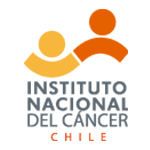 Established in Profesor Zañartu 1010, independencia- Santiago (Chile).
Established in Profesor Zañartu 1010, independencia- Santiago (Chile).
The National Cancer Institute was founded in 1990 and has excelled in its clinical and administrative-financial management, an experience it has shared with other public and private health establishments. We have considered it relevant to include this information in these pages.
All the achievements of the institution are the result of the work of a team committed to public health, which believes that equity in health is possible and that, above all, works for the respect and dignity of the human being.
Vision
To lead processes that allow us to reduce cancer in Chile
Mission
We are a healthcare, teaching, and research center that provides excellent humane, professional, and technological care to patients, their families, and the community, supported by the quality of our staff and their continuous and comprehensive improvement. We contribute to strengthening the national oncology network and to the development of health policies realated to cancer.
Institutional Values
- Excellence
- Humanity
- Trust
- Ethics
- Respect
- Loyalty
- Leadership
- Commitment
- Solidarity
- Equity
Members:
- Ana María Barria, Medical Oncologist
- Francisco Bengoa, Traumatologist
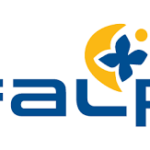 Established in Jose Manuel Infante 805 (Chile).
Established in Jose Manuel Infante 805 (Chile).
The Arturo Lopez Perez Foundation (FALP) was founded in 1954 thanks to a donation form Mrs. Ana Ross, widow of Arturo Lopez Perez, a prominent businessman at the Valparaíso Stock Exchange.
We are a non-profit institution that seeks to provide timely access – epecially to the most vulnerable families – to comprehensive treatment in a highly specialized Oncology Center, in a respectful and caring environment where patients and their families feel safe and welcomed.
We contribute to the development of the country’s oncology sector with cancer education, prevention, and early detection programs, utilizing innovative technologies, developing advanced research, and training specialized professionals.
We want to contribute to ensuring that social status is no longer and impediment to receiving timely, comprehensive, and excellent cancer care in our country. We wanto to ensure that teaching and research contribute to the development of better treatments and help people acquire healthy lifestyle habits and take and active role in their care, thereby reducing the risk of being affected by cancer.
Values
- Respect
- Responsibility
- Collaboration
- Efficiency
- Transparency
Members:
- Felipe Buscagli, Pathologist
- Francisco Bengoa, Traumatologist and head of the sarcoma team
- Christian Lorenzo Caglevic, Medical Oncologist
- Gabriel Garcia, Traumatologist Surgeon
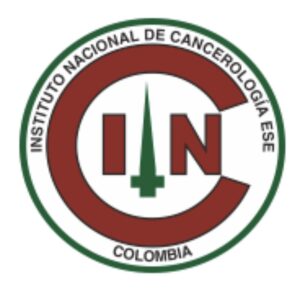 Established in Cl. 1 #9-85, Bogotá (Colombia).
Established in Cl. 1 #9-85, Bogotá (Colombia).
We are a national institution of the Colombian State of special regime and advisor to the Ministry of Health and Social Protection and other actors, which develops activities of technical-scientific authority through research, development and innovation; public health programmes, comprehensive patient care; training of highly specialised human talent, for the understanding and control of cancer.
Our principles:
- Person-centred organisational culture
- Timeliness of our actions
- Multidisciplinary work
- Results orientation
- Safety of our actions
- Service based on respect for differences.
Our values:
- Responsibility for our actions
- Public values
- Transparency of our actions
- Consideration for the conditions and needs of others
- Creativity as a basis for innovation and knowledge creation.
Members:
- Andrea Zuluaga Liberato, Medical Oncologist and Partner Leader
- Patricia López, Pathologist
- Juan Sebastian Alonso Ojeda, Radiation
- Holman Ballesteros, Radiation Oncologist
- Carlos Andres Carvajal, Thoracic Surgeon
- Mario Alexander Melo, Pathologist
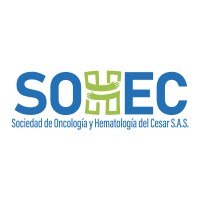 Established in Cra. 15 #14 – 91, Valledupar, Cesar (Colombia).
Established in Cra. 15 #14 – 91, Valledupar, Cesar (Colombia).
The Sociedad de Oncología y Hematología del Cesar SAS was founded in 1996 by doctors Raimundo Manneh Amastha and Germán Morón Gutiérrez, with the aim of providing specialised care in oncology and haematology in the region of Cesar and La Guajira. Initially located in the Centro Médico de Especialistas San Jorge, the institution grew to open its own building in 2001, offering chemotherapy, radiotherapy and brachytherapy services.
Over the years, it has received quality certifications such as ISO 9001 and Good Manufacturing Practices (GMP) certification from INVIMA, standing out for its humanised and specialised care.
We are an institution that provides health services to oncology patients and haematological disorders, guaranteeing reliable, comprehensive and successful treatments through innovation, improved patient safety and human warmth, seeking to satisfy their needs and expectations.
The humanisation of our service is our central axis, which is expressed and concretised in the following values:
- Trust
- Honesty
- Responsibility
- Respect
- Solidarity
Members:
- Edgar Danilo Aguirre, Medical Oncologist
- Klary Joans Jimenez, Radiation Therapist
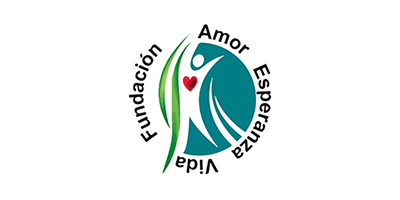 Established in Avenida 16 Calles 10 y 14 Heredia, Heredia 40101 (Costa Rica).
Established in Avenida 16 Calles 10 y 14 Heredia, Heredia 40101 (Costa Rica).
The Foundation was legally stablished on June 8th, 2012 by Amelia Barquero Trejos and Jorge Álvaro Chaves Villalobos, hematologist; in order to support patients suffering from cancer and their relatives located in Heredia, Costa Rica.
The Foundation is made up of Heredian citizens from different cantons and various disciplines that serve ad-honorem, donate their time in favor of the success of the Foundation’s own projects.
The mission of the organization is based on the principles of solidarity, work, love and respect for others; joining efforts to support the patient suffering from cancer in Heredia. FUNDAEVI reaches this goal trough the development of projects and the promotion of healthy lifestyles in the entire population of the province of Heredia as well as the psycho-education of cancer as a measure of containment in the face of the emotional and social impact that the cancer diagnosis produces in the patient and their relatives.
Members:
- Natalia Jiménez, Medical Oncologist and Partner Leader

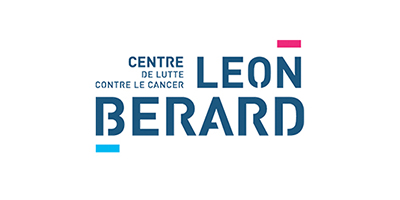 Established in Rue Laennec 28, Lyon 69373 (France).
Established in Rue Laennec 28, Lyon 69373 (France).
The Centre Léon Bérard (CLB) is part of the twenty French Comprehensive Cancer Centers, providing a global management of cancer patients on a unique area, from diagnosis to treatment and beyond. The Centre is a regional, national and international recognized reference cancer Centre assigned with three essential missions: Care, Research and Education and is willing to continuously improve the quality and accessibility of care for cancer patients. More than 30,000 patients are received each year, on consultations or exams and 6,000 new cancer cases are diagnosed.
The CLB has technical and treatment facilities (operating rooms, radiation therapy center, medical imaging departments, pathology and nuclear medicine departments). The bench-to bedside process is one of the strength of the Centre Léon Bérard. The Centre Léon Bérard develops an excellence and multidisciplinary research, in association with the cares carried out on site and institutional and private partners. The foundations of this development lay in the medical and scientific project. The CLB aims to reinforce the bench-to-bedside process by facilitating translational research to help innovation and speed-up its access to patients for diagnoses and therapies. Clinical research has been certified ISO 9001 since 2013 and is thus one of the strength of the Centre. As a result, more than 20% of patients were included in clinical trials in 2016. At the Centre Léon Bérard 1,700 persons work in cares, research, education and supportive care (200 physicians, 500 researchers, 600 caregivers). CLB is a reference center within the European Reference Network (ERN) EURACAN.
Members:
- Jean-Yves Blay, Medical Oncologist and Partner Leader
- Armelle Duifresne, Medical Oncologist
- Mehdi Brahmi, Medical Oncologist
- Francois Gouin, Surgeon
- Isabelle Ray-Coquard, Medical Oncologist
- Marie Karanian, Pathologist
- Pierre Meeus, Surgeon
- Julien Bollard, Project Manager
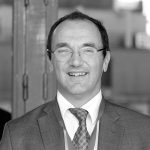
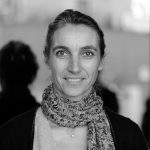
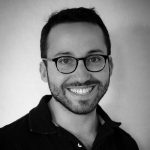
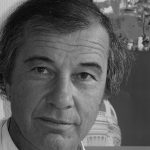
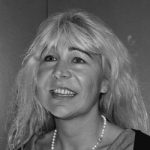
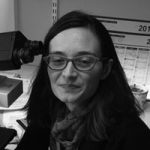
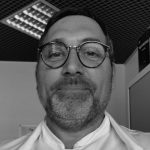
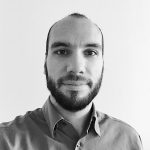
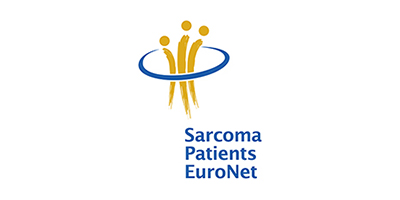 Established in Untergasse 36, Wolfersheim 61200 (Germany). VAT number: DE268771102.
Established in Untergasse 36, Wolfersheim 61200 (Germany). VAT number: DE268771102.
Sarcoma Patients EuroNet Association (SPAEN) is the international network of sarcoma, GIST and desmoid patient advocacy groups. It was founded in April 2009 with the aim of extending information services, patient support and advocacy to patient organisations for the benefit of sarcoma patients across the whole of Europe and internationally. Acting in partnership with clinical experts, scientific researchers, industry and other stakeholders SPAEN is working to improve the treatment and care of sarcoma patients through improving information and support, and by increasing the visibility of sarcoma with policymakers and the public.
SPAEN’s objectives are:
- Identify problems, challenges, access issues and unmet medical needs in sarcomas. Find solutions and improve the situation by collaborating with leading sarcoma experts, researchers, industry and other relevant international stakeholders in an outcome-oriented way.
- Sarcoma patients need timely and accurate diagnosis and need to be treated according to guidelines – ideally as early as possible in multidisciplinary sarcoma expert centres. SPAEN advocates and supports the implementation of these structures and pan-European collaboration between these centres.
- Clinical research, studies and generating data are essential parts of the process of developing better and innovative treatment solutions. SPAEN aims to be involved as early as possible in clinical trials, to try to improve patient’s access to studies and to support meaningful research – following the specific needs of rare cancer patients.
- Sarcoma patients and their relatives need a strong “United Sarcoma Patient Voice” and strong “National Patient Support Opportunities”. That’s why SPAEN cares for their members – the existing national patient organisations and encourages the creation of new ones.
“Together we can make a difference for those affected by sarcomas!”
Members:
- Markus Wartenberg, SPAEN/German Sarcoma Foundation and Partner Leader
- Bernd Kasper, SPAEN/German Sarcoma Foundation and Medical Oncologist
- Olga de la Llana , SPAEN/AEAS Spain
- Natalia Fernandez, SPAEN/AEAS Spain
- Michaela Geissler, Project Management and Administration
- Kathrin Schuster, Communications and Project Management

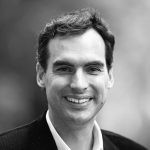
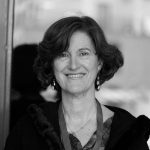
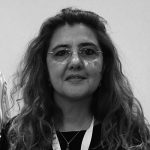

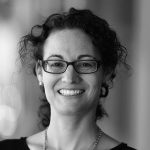
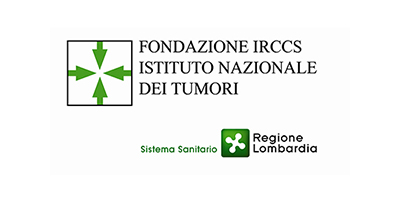 Established in Via Venezian 1, Milan 20133 (Italy). VAT number: IT04376350155.
Established in Via Venezian 1, Milan 20133 (Italy). VAT number: IT04376350155.
Fondazione Istituto Nazionale Tumori, Milano, Italy (INT) is the largest comprehensive cáncer centre in Italy. Since its establishment (1928), it has aimed to provide the highest standards of cancer care and to pursue preclinical and clinical research in such a way as to swiftly translate innovation into better prevention, diagnosis, therapy and rehabilitation for Italian cáncer patients. INT has a long-standing record on rare cancers, serving as one of the Italian reference centers for several rare cancers, including childhood cancers, sarcomas, head & neck cancers, peritoneal and pleural mesothelioma and thymoma, neuroendocrine tumors, male genital tumors, rare female genital cancers, lymphomas and myeloma. INT coordinates the Italian Rare Cancer Network, i.e., a healthcare national network exploiting telemedicine for distant rare cancer case-sharing between reference centers and medical oncology facilities.
Description of the department contributing to the execution of the project
Medical Oncology Unit 2 (“Mesenchymal adult tumors & Rare cancers”) is a medical oncology facility exclusively devoted to a family of adult rare solid cancers, i.e., sarcomas. This Unit coordinates the Italian Rare Cancer Network, and works in close collaboration with the Italian Sarcoma Group (the Italian collaborative research group on sarcomas), Rare Cancers Europe (a multi-stakeholder European effort on rare cancers), the EORTC Soft Tissue and Bone Sarcoma Group. The Unit has been actively involved in the production of clinical practice guidelines on bone and soft tissue sarcomas at a national and European level. It will also coordinate the forthcoming EU Joint Action on Rare Cancers, aiming to produce consensus-based recommendations about rare cancers to improve epidemiological surveillance, quality of healthcare, availability of clinical practice guidelines on rare cancers, innovation and patient empowerment, with a view to the implementation of the new European reference Networks on rare cancers. INT is a reference center in sarcoma within the European Reference Network (ERN) EURACAN.
Sarcoma Service is a surgical facility entirely devoted to the care of soft tissue sarcoma, gastrointestinal stromal tumors and desmoid tumors patients. It is one of the largest Surgical facilities in Europe. Every year some 1500 new patients are seen in consultation in our clinics. 400 of them are then operated at our institutions: of them some 220 are affected by soft tissue sarcoma of the extremities and trunk wall, 150 by abdominal sarcoma (including retroperitoneum, GIST and gynecological sarcoma), 30 by bone sarcoma of the trunk. In addition some 200 patients affected by desmoid tumor are regularly seen in our clinic. The Service holds an institutional prospectively maintained data base which gathers clinical and biological information on over 9000 patients affected by soft tissue sarcoma, desmoid and GIST, treated over the past 3 decades in Milan. Along with the medical ocology unit it chairs the sarcoma track of the Italian Network of Rare Cancers and the European Reference Network on adult rare canceers (EURACAN). It is involved in the board of the Italian Sarcoma Group, of the EORTC Soft Tissue and Bone Sarcoma Group, of the Italian Society of Surgical Oncology, of the European Society of Surgical Oncology, of the Society of Surgical Oncology. It is in the faculty of the new WHO Soft Tissue and Bone Sarcoma classification. It has initiated a large collaborative Network on retroperitoneal sarcoma (Transatlantic Australasian RetroPeritoneal Sarcoma Working Group – TARPSWG), which involves over 50 institutions worldwide. It chairs the European School of Soft Tissue Sarcoma Surgery of the European Society of Surgical Oncology. It hosts the elective rotation of Surgical Oncology fellows from Europe and North America, with a specific link with the program at the University of Toronto – Canada.
Members:
- Salvatore Provenzano, Medical Oncologist
- Paolo Giovanni Casali, Medical Oncologist
- Annalisa Trama, Epidemiologist
- Silvia Stacchiotti, Medical Oncologist
- Silvia Brich, Biologist
- Paola Collini, Pathologist
- Alessandro Gronchi, Surgical Oncologist
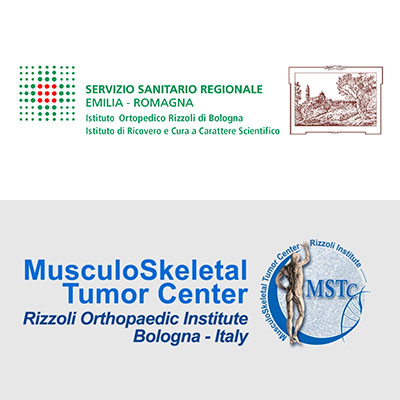 Established in Via Di Barbiano 1/10, Bologna 40136 (Italy). VAT number: IT00302030374.
Established in Via Di Barbiano 1/10, Bologna 40136 (Italy). VAT number: IT00302030374.
The Rizzoli Orthopedic Institute (IOR) is the only Italian orthopedic public hospital recognized as a National Institute for Research and Health Care (IRCCS). It comprises therefore treatment and research where its high level of healthcare is the result of intense scientific research with the aim to transfer these research results into clinical practice. Its high expertise; its model of organization aimed at integration between research and treatment and the offer of high quality healthcare as well as innovative technologies in continuous evolution are the strengths that make the Rizzoli Institute one of the most clinically and scientific recognized site of excellence in orthopaedic. It is organized in Departments that group wards and healthcare services and research laboratories. The units are specialized in: treatment of tumors of the musculoskeletal system, degenerative pathologies of the hip and knee; spine pathologies, pathologies of the foot and upper limbs; sports pathologies; pediatric orthopaedic pathologies; and diagnosis and treatment of rare skeletal diseases. Musculoskeletal oncology is one of the main field of interest and excellence of the Institute. The Institute founded and chair the Italian Sarcoma Group (ISG): the Italian network that comprises all the professionals involved in treatment and research in sarcomas, committed to the study, development and share of best practices in sarcoma management. Both IOR and ISG are partner of Alliance Against Cancer (ACC) that is the Italian Minister of Health network for research and care in oncology. IOR is a reference center in sarcoma within the European Reference Network (ERN) EURACAN.
Description of the department contributing to the execution of the project
Sarcoma treatment, management and research are the main fields of interest and excellence of the Institute. About 50% of all new cases of Italian primary malignant bone tumors (and about 20% of soft tissue sarcomas) are yearly treated, in a dedicated Department of Orthopedic Oncology (40 beds), in a Department of Spine Orthopedic Oncology, and in a dedicated Department of Medical Oncology (pediatric and adult) with 13 beds, including a Transplant Unit for high dose treatments. Phase I, II and III clinical trials are regularly performed in the Institute. Regarding translational research, the Laboratory of Experimental Oncology, connected also to the Surgical Pathology Department, has an experience of more than 20 years in the field with about 30 young and senior researchers. Studies performed in the Laboratory has contributed to definition of clinical studies (i.e. IGF in Ewing and osteosarcoma, P-glycoprotein in osteosarcoma). A specific musculoskeletal biobank with more tan 7.000 frozen specimen is also available for the project, including material from the rarest neoplasms, with homogenous clinical data. Through the ISG network, founded and leaded by the Director of the Laboratory of Experimental Oncology, Dr. Piero Picci, IOR is a point of reference for the improvement of quality of the overall management and treatment of sarcoma patients by promoting and sharing the best national and international practice guidelines and expertise through all the ISG network members. On 1974 the Musculoskeletal Oncology Departments developed a specialistic educational program (The Course on Musculoskeletal Pathology) addressed to Orthopedic Surgeons, Pathologists, Radiologists, Oncologists, Radiotherapists and Basic Researcher with the aim of s to improve knowledge and competence on these pathologies, by working in multidisciplinary teams. The course is now at its XXIXth edition. The Pathology Department is the Italian reference center for the Italian Association of Pediatric Oncohematology (AIOP) for the diagnosis of pediatric tumors.
Members:
- Alberto Righi, Pathologist and Partner Leader
- Emanuela Palmerini, Medical Oncologist
- Marco Gambarotti, Pathologist
- Davide Maria Donati, Orthopedic Surgeon
- Katia Scotlandi, Biologist
- María Cristina Manara, Medical Oncologist
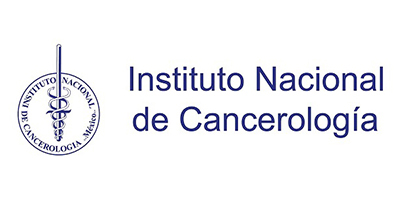 Established in Avenida San Fernando 22, Mexico 01480 (Mexico).
Established in Avenida San Fernando 22, Mexico 01480 (Mexico).
The National Institute of Cancerology is a decentralized organization of third level, linked to the Ministry of Health. It provides specialized medical care to cancer patients and is also a referral center and cancer’s governing body in Mexico. It is part of a comprehensive system of 12 highly specialized hospitals that provide public health services to the population. Since 1980, importance was placed on the developed areas of Basic and Clinical Research. With regard to equipment, the Institute placed among the best oncologic units in the country.
The Institute has achieved international recognition for its participation with institutions such as the American Society of Clinical Oncology (ASCO), the International Union Against Cancer (UICC), the University of Texas MD Anderson Cancer Center (UTMDACC), and the National Cancer Institute (NCI) of the National Institutes of Health (NIH) in the U.S. The INC is the coordinator of 25 State Cancer Centers (CEC) in Mexico, thus offering a unique possibility for designing common programs and strategies for better cancer control of a national character, and for achieving an impact at the national level on improving cancer prevention and early detection, reducing the morbi-morbility of cancer in Mexico.
An Information Center (INFOCANCER) was established for patients with cancer, their relatives, and for the public in general. Its objective is to provide simple and accessible information to the general public on cancer.
INC coordinates the development of the National Program of Control of Cancer (PNCC), which includes five central themes:
- Prevention and early detection of cancer.
- Oncological guides for the 10 most frequent neoplasms in Mexico.
- Palliative care.
- Medical infrastructure and Medical services administration.
- Control of tobacco consumption.
Members:
- Jorge Luis Martínez Tlahuel, Medical Oncologist and Partner Leader
- Claudia Haydée S. Caro Sánchez, Pathologist
- Mario Cuellar Hübbe, Oncologist Surgeon
- Héctor Martínez Said, Oncologist Surgeon
- Jorge Alegría Baños, Medical Oncologist
- Dorian Yarih García Ortega, Oncologist Surgeon
- Nora Álvarez Águila, Radio-Oncologist
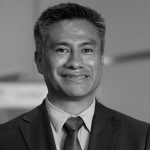

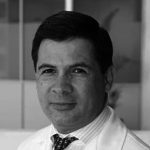
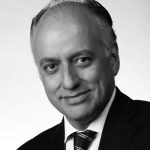

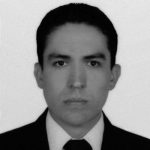
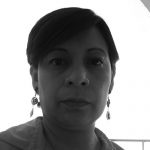
Established in Av.Balboa y Calle 34,0816-00383 (Panama).
The Hospital del Niño Dr. José Renán Esquivel is a paediatric institution of national reference in Panama, dedicated to the diagnosis, treatment and research of diseases in the paediatric population. Its history dates back to 1958, when it was created as an autonomous entity under the management of a Board of Trustees, thanks to the impulse of the Lions Club and the leadership of prominent physicians such as Dr. Rodolfo Arce and Dr. José Renán Esquivel.
Since its beginnings, the hospital has constantly evolved, expanding its infrastructure and services. It has been a pioneer in the training of paediatricians in the country, and has promoted the humanisation of care, allowing the presence of family members during hospitalisation and offering psychosocial support programmes.
Its achievements include the implementation of cardiovascular surgery programmes, the creation of the country’s first milk bank, the development of neonatology and paediatric oncology services, and the strengthening of its capacities in research, teaching and international cooperation.
Currently, the hospital is in the process of building a new modern headquarters, with the aim of improving the quality of care and responding to the growing demands of child health in Panama and the region. The institution maintains strategic alliances with national and international organisations and actively participates in continuous training initiatives, medical innovation and the defence of children’s rights.
Members:
- Patricia Bonilla, Orthopaedic Oncologist
- Karina Quintero, Head of Oncology
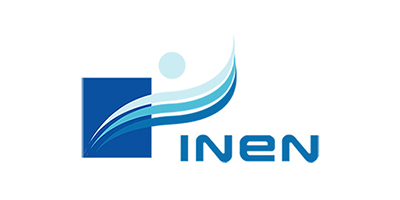 Established in Avenida Angamos Este 2520 Urb La Calera de la Merced, Lima (Peru). VAT number: PE20514964778.
Established in Avenida Angamos Este 2520 Urb La Calera de la Merced, Lima (Peru). VAT number: PE20514964778.
The National Institute of Neoplastic Diseases, better known as INEN, is a Peruvian public hospital managed by the Ministry of Health of Peru. Founded by Law Nº8892, which established the creation of the National Cancer Institute. This hospital provides health services to the population suffering from different types of cancer. The National Institute of Neoplastic Diseases is an institution specialized in the detection, diagnosis, treatment and rehabilitation of tumoral or neoplastic diseases.
Members:
- Víctor Castro Oliden, Medical Oncologist and Partner Leader
- Sandro Casavilca Zambrano, Pathologist
- Lourdes Huanca Amesquita, Pathologist
- Mónica Calderón Anticona, Medical Oncologist
- Juan Carlos Haro Varas, Medical Coordinator
- Martín Falla Jiménes, Medical Oncologist
- Marco Velarde Méndez, Medical Oncologist
- Alberto Lachos Dávila, Radiotherapist
- Darwin Salazar Salazar, Medical Traumatologist Oncologist
- Macarena Farias Loza, Coordinator
- José Manuel Cerapio Arroyo, Administrative Coordinator
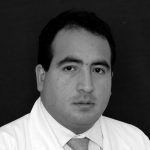
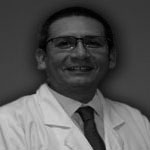
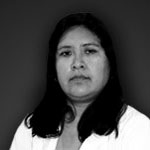

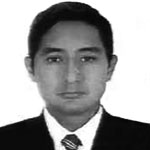
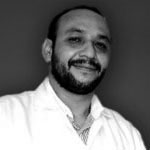
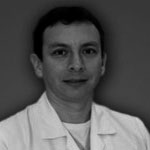
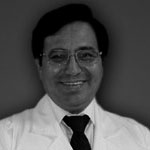
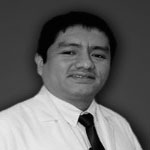
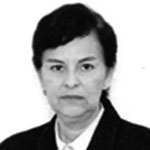
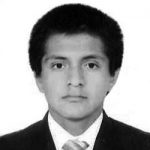
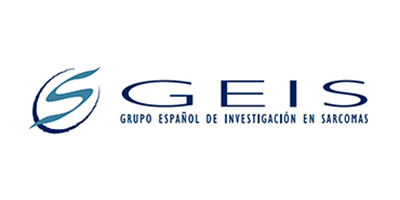 Established in Calle Velazquez 7 3rd Floor, Madrid 28001 (Spain). VAT number: ESG81890212.
Established in Calle Velazquez 7 3rd Floor, Madrid 28001 (Spain). VAT number: ESG81890212.
The Spanish Group for Research on Sarcomas (Grupo Español de Investigación en Sarcomas, GEIS) is a non-profit medical research association dedicated to improve the outcome of Spanish sarcoma patients through research and dissemination. GEIS is composed of more than 500 members from over 110 Spanish hospitals, including medical oncologists, radiotherapists, pathologists, surgeons, radiologists and basic researchers. The goals of GEIS are to empower sarcoma clinical research through the design and execution of cooperative clinical trials with relevant results for the treatment of sarcoma patients, to establish diagnosis and treatment guidelines based on the best evidence, and to serve as a point of reference for the treatment of sarcomas, collaborating with similar groups at international level. Since its foundation, GEIS has carried out more than 60 multicentre clinical studies in sarcomas at both national and international levels. GEIS is Spain’s leading research organization in sarcomas and via its national network of associated hospitals, covers the majority of the Spanish territory, has the capacity to design and develop clinical trials with nationwide recruitment potential.
Members:
- Claudia Valverde, President of GEIS, Medical Oncologist and Partner Leader
- Patricio Ledesma, Financial Manager
- Melissa Fernández Pinto, Project Manager
- Adriana Rojo, Project Manager
- Antonio Gutiérrez, Statistician
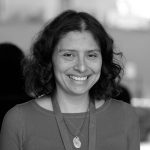
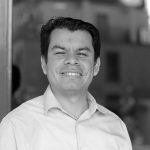
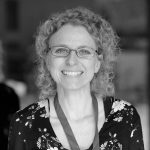

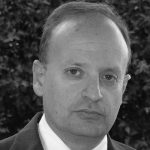
Established in Avda. Reyes Católicos, 2. Madrid 28040 (Spain). VAT number: ESG85874949
The Hospital Universitario Fundación Jiménez Díaz (HUFJD) has undergone a significant evolution since its foundation in 1935 as the Instituto de Investigaciones Médicas. It has been a cornerstone in the history of medical and clinical research in the country, due to the implementation of pioneering medical procedures, being the first Hospital to perform heart surgery, to establish an ICU, etc. In addition, it is an institution committed to medical education, promoting the first postgraduate teaching programs (MIR) since 1960, and integrated in the Medicine Teaching Program of the Universidad Autónoma de Madrid since 1970.
Translational Oncology division bases its main research activity on Translational Oncology. Since the beginning of its activity at the IIS-FJD in 2012, it has incorporated relevant senior researchers with extensive experience in different fields of biomedical research. The strategy is aligned with the fusion of the background and trajectory of each senior researcher to undertake common objectives. As a result, the group has obtained notable achievements such as patents, research projects, more than 90 scientific articles, doctoral theses, etc. This environment, together with the collaboration of key departments such as Pathology and Surgery, and the support of South Texas Accelerated Research Therapeutics, makes the group a reference laboratory in Translational Oncology.
Members:
- Javier Martín-Broto, Medical Oncologis and SELNET Consortium Chair
- Nadia Hindi Muñiz, Medical Oncologist
- David da Silva Moura, Scientific Manager
- Jesús García Foncillas López, Medical Oncologist and Chair of Oncology Department
- Carlos López, Medical Oncologist
- Gloria Márquez, Medical Oncologist
- Montiel Jiménez Fuertes, Surgical Oncologist
- Laura Guzman Gómez, Radiotherapy Oncologist
- Pedro Villarejo Campos, Surgical Oncologist
- Danilo E. Salazar, Radiologist, Musculoskeletal Unit
- Javier Fernández Jara, Radiologist, Musculoskeletal Unit
- Alfonso Enrique Maldonado, Radiologist, Musculoskeletal Unit
- Marta Renshaw, Laboratory Technician
- Celia Viejo Martínez, Pathologist
Established in Paseo Isabel la Catolica, 1 (Spain). 
Our hospital is the largest in Aragon and the fifth hospital in Spain with the largest number of beds. Some services are a reference for other hospitals in the Autonomous Community of Aragon and also for other neighbouring autonomous communities.
It is a National Reference Centre (CSUR) for multiple sclerosis and performs kidney, heart, bone marrow, cornea, bone and tendon transplants.
Specialised care is also provided at the ‘Ramón y Cajal’ and ‘San José’ Specialty Medical Centres.
The more than 8,000 workers who make our hospital’s day-to-day work possible are constantly updating our training to offer personalised, quality healthcare.
Members:
- Javier Martínez Trufero, Medical Oncologist
Established in Av. Manuel Siurot, s/n (Spain).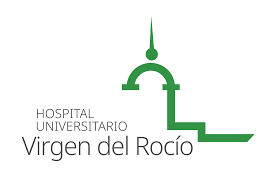
The General Hospital was inaugurated on 22 January 1955. It has been treating patients for more than half a century and has been training residents for more than half of that time.
From 1938 to 1963, the period known as the harmonisation and development of Social Security in our country took place, with the creation of the Compulsory Health Insurance (S.O.E.), the Labour Mutual Societies, the Institute of Medicine and Hygiene in the Workplace, etc. Between the General Scheme and the Special Social Security Schemes, a high percentage of the population became beneficiaries of the Health Insurance Health Services.
In order to meet the needs of the insured with their own resources, a series of hospitals were built throughout the country, which became known as ‘Residencias Sanitarias’, to ‘differentiate’ them from the in-patient health centres of the Charity called ‘Hospitals’. The Residencias were also called Instituciones Cerradas (Closed Institutions), which differed from the Open Institutions (consulting rooms and outpatient clinics) because of the closed, in-patient regime (hospitalisation) in which patients were treated. They were generally located in the capitals of each province. The one in our city was located in the southern area, in the grounds of the old Exhibition of 1929.
The centre was called Residencia García Morato until 1984, when it was renamed Hospital General (HG); it had eleven floors and 690 beds, assigned to the services of Internal Medicine, Surgery and Specialities, Gynaecology and Paediatrics. Later, coinciding with the progressive increase in demand, which exceeded the hospital’s possibilities, new centres were built and incorporated:
On 16 June 1968, the Rehabilitation and Traumatology Hospital (HRT) was inaugurated, with 325 beds and new specialities. After the opening of this second hospital, the complex was called Ciudad Sanitaria Virgen del Rocío. Other services were added, such as the School of Nurses (interns) located in the current Laboratory Building.
It soon had MIR Postgraduate Training: The first promotion joined on 2 May 1969 and consisted of 24 Internal Doctors, some of whom are still active in 2008.
Then the Maternity Hospital was built, inaugurated on 16th April 1971, with 356 beds and the Children’s Hospital, inaugurated on 1st May 1971, with 352 beds. It has buildings such as a Thermal Power Station, Laundry and Stores. Subsequently, the Diagnosis and Treatment Centre (CDT) and Pathological Anatomy (AP) buildings were built, inaugurated on 1st February 1978.
In 1986, as a result of the Decree regulating the Hospitals and their governing bodies published that year, the Health City was renamed the Virgen del Rocío Hospital. Since 29 October 1987, when the agreement with the University of Seville was signed and undergraduate medical teaching began (in application of the University Reform Act of 1986), it has been called the Virgen del Rocío University Hospital.
On 2nd March 1992, the former Provincial Oncology Hospital ‘Duque del Infantado’ (which in 1929 was the Basque Pavilion at the Ibero-American Exhibition) was incorporated into the hospital and is now used for general purposes, with special areas for Major Outpatient Surgery and Palliative Care; it has more than 100 beds.
In all these centres of the health complex, in addition to the care of patients assigned to the hospital area, there is undergraduate medical and nursing teaching, specialised nursing training, continuing education for all levels (health and non-health) and specialised postgraduate medical training in 43 accredited Teaching Units (UD; doctors, pharmacists, psychologists, biologists, biochemists and radiophysicists).
In 2006, the Institute of Biomedicine of Seville (IBIS) was created by virtue of an agreement signed by the Ministry of Health of the Andalusian Regional Government, the Ministry of Innovation, Science and Enterprise of the Andalusian Regional Government, the Andalusian Health Service, the University of Seville and the Higher Council for Scientific Research. It incorporated an innovative project that allows the training and development of translational research and MIR training in our Centre: the MIR HUVR-IBIS programme. The strategic objective is to generate synergies and research alliances between the different care services and the research groups based at IBIS by creating the figure of the MIR-researcher.
Members:
- Irene Carrasco, Medical Oncologist
Established in Pg. de la Vall d’Hebron, 119, Horta-Guinardo, Barcelona (Spain).
In 2016, the Vall d’Hebron Barcelona Hospital Campus was formalised, a project that strengthens the pioneering and avant-garde spirit of five institutions, which excel in care, research, teaching and innovation.
Always in contact with the patient, we start from the challenges we face on a daily basis to continue innovating and finding new diagnoses and treatments. With the talent that has made us leaders, we continue to work to attract more excellence and train the best professionals in clinical practice.
We are united by the same avant-garde spirit of excellence, with a common goal: to improve people’s health and well-being. We join forces to become bigger, more useful, more productive and even more effective. We want to be a health campus of reference in the world, and that is why we have set out the principles that will help us to achieve this.
People, at the centre
Our raison d’être is people; patients and professionals are always at the centre of the hospital campus’ activities.
Innovation
We carry out projects that improve patient care and quality of life, even beyond the walls of the Campus.
Excellence
The Campus is the sum of five excellent institutions in the field of bio-health, each specialising in a specific field of expertise, with prestigious and internationally recognised professionals.
Knowledge
We generate, transform and transmit knowledge. We research new techniques and understand teaching as a strategic axis of the healthcare system.
Members:
- Claudia Valverde, Medical Oncologist
Established in Carretera Ofra s/n. La Laguna 38320 Santa Cruz de Tenerife (Spain).
The University Hospital of the Canary Islands (HUC) received its first patients on 17th July 1971 after the closure of the Hospital Nuestra Señora de los Desamparados. That same year an agreement was signed for its use by the Faculty of Medicine to carry out healthcare and teaching activities.
Also in 1971, an agreement was approved between the Island Council and the Social Security, which meant that it was opened to the entire population of the Island. In 1983 it was renamed the University Hospital of the Canary Islands.
The purpose of the HUC is to carry out the health care activities of the hospital itself, as well as those of the External Mental Health Area and the Specialised Care Centres (CAEs) of the northern area, the provision of care for the reference services assigned at provincial or regional level, the training of undergraduates and postgraduates in Medicine, Nursing, Physiotherapy and other Health Sciences, and research in these fields.
At present, the University Hospital of the Canary Islands forms part of the University Hospital Complex of the Canary Islands together with the Hospital del Norte, the External Mental Health Area and the Specialised Care Centres (CAEs) of La Laguna, La Orotava and Puerto de la Cruz.
It is a reference hospital for living and cross-donor kidney transplants, renopancreatic transplants, implantation of sacral neurostimulators, congenital metabolopathies and treatment of human infertility. It has also been designated as the reference hospital for the province of Santa Cruz de Tenerife for kidney transplants and heart surgery.
Members:
- Josefina Cruz, Medical Oncologist
Established in P.º de la Castellana 261, Fuencarral-El Pardo Madrid (Spain).
The Hospital Universitario La Paz is a public hospital belonging to the Community of Madrid, located in the north of Madrid. Since the inauguration of the General Hospital in July 1964, its physiognomy has been changing and growing to become the large hospital complex we know today, comprising a network of 17 buildings and four large hospitals: the General Hospital, the Maternity Hospital, the Children’s Hospital and the Traumatology and Rehabilitation Hospital.
The Hospital Universitario La Paz provides healthcare services to the people of the municipalities in the northern health area through the Bravo Murillo, Peñagrande and Colmenar Viejo speciality centres, as well as the Cantoblanco Hospital, attached to La Paz in 2005, and the Carlos III Hospital, which was attached at the end of 2013. It also offers specialised healthcare to a large number of patients from all over Spain and even from other countries.
Mission
To offer society safe healthcare, based on professional and human excellence, with the patient and their family at the centre of our attention.
Vision
- To be a centre of national and international reference and excellence in healthcare, teaching and research for all stakeholders.
- To improve healthcare through innovation and technological transformation, guaranteeing the sustainability of the system.
- To encourage the growth of our professionals, seeking loyalty and commitment to our project.
Values
- Excellence
- Teaching
- Quality
- Sustainability
- Professional competence
- Teamwork
- Humanisation
- Research
Members:
- Eduardo Ortiz, Orthopaedic Oncological Surgeon
Established in Begiristain Doktorea Pasealekua s/n Gipuzkoa (Spain).
Donostia University Hospital is the largest hospital in Gipuzkoa and a benchmark in the Basque Country and Spain in healthcare, teaching and research. It is part of the Donostialdea Integrated Health Organisation (OSI Donostialdea) and is linked to the University of the Basque Country (UPV/EHU) for the training of health professionals.
This highly complex hospital offers a wide range of medical and surgical specialities, including oncology, advanced surgery, neurology, cardiology and transplants, among others. It also has units specialising in rare diseases and innovative treatments.
El Hospital Universitario Donostia destaca por su compromiso con la investigación biomédica, colaborando con centros como el Instituto Biodonostia, donde se realizan estudios en diversas áreas de la medicina traslacional. Su participación en ensayos clínicos y proyectos internacionales lo posiciona como un referente en la mejora de los tratamientos y la innovación sanitaria.
Además, sus modernas infraestructuras y la integración con la red sanitaria pública del País Vasco garantizan una atención al paciente de calidad, con un enfoque multidisciplinar y un enfoque a la excelencia asistencial.
Miembros:
- Ana Paisán, Médica Oncóloga

